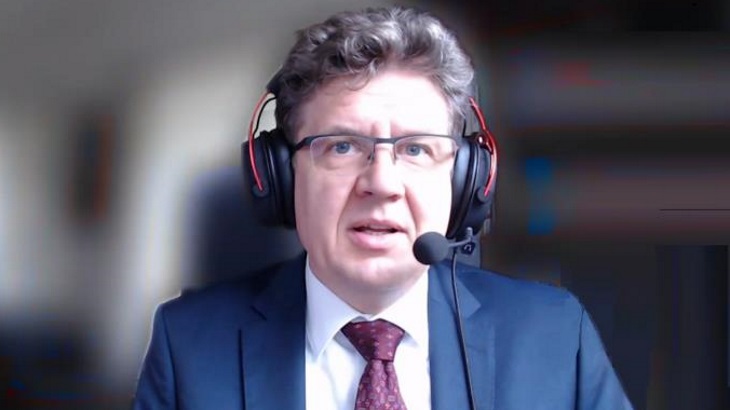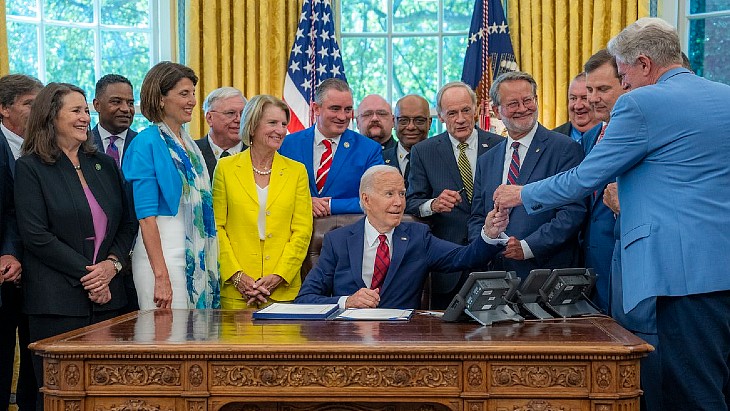IAEA endorses Hungarian university programme

The IAEA's INMA supports universities in establishing and delivering master's degree programmes on technology management for the nuclear sector, including nuclear power programmes, nuclear applications and radiological technologies. It provides guidance for master’s programmes that have a specialised focus on the advanced aspects of management and leadership required by the nuclear sector.
Aszódi said the IAEA has stringent requirements on INMA programme content and composition, which are assessed during the endorsement process.
"Hungary is a small country in Central Europe. We have one single nuclear power plant but it plays a very important role in electricity supply. We have a quite big - relative to the size of the country - nuclear industry because of that power plant, but we are not component or nuclear power plant suppliers; we are users of nuclear energy," Aszódi told participants in the webinar.
"The 238-year-old BME is the biggest technical university in Hungary and for the long-term development of nuclear energy it is essential to train managers who have up-to-date knowledge not only in nuclear sciences, but also have advanced management and leadership skills," he added.
BME has a long history and wide experience of running bachelor, master's, post-graduate and PhD programmes in nuclear energy and nuclear technology. Among these, it offers “nuclearisation” courses, Aszódi said, for the non-nuclear engineers - civil, electrical and mechanical - needed at nuclear power plants. For the past 30 years, BME has also offered MBA (Master of Business Administration). Its new Nuclear Technology Management (NTM) programme "combines advantageously", he said, the reactor technology postgraduate degree programme with the MBA programme in cooperation with the Institute of Nuclear Techniques in the Faculty of Natural Sciences and the Faculty of Economics and Social Sciences.
BME's NTM postgraduate degree programme has been developed in full compliance with IAEA's INMA recommendations, Aszódi said. Receiving the IAEA's endorsement for its two-year (four-semester) programme enhances the university’s reputation both in Hungary and internationally, he said. National accreditation of the programme was achieved at the turn of this year, and by the IAEA in the summer of this year. Owing to the pandemic, the IAEA’s endorsement mission in July was conducted online.
Aszódi said the programme reflects the "ever-increasing demand" for highly qualified and skilled nuclear specialists to keep pace with technological, policy and strategic objectives. Areas where up-to-date knowledge is essential, he said, include: the operation of Hungary's nuclear power plant units at Paks; the replacement of senior personnel nearing retirement; the licensing, construction and future commissioning of new units at Paks; the development of Hungary's energy system; the design, implementation and operation of nuclear research facilities; and support for related service activities. BME has launched the NTM programme in order to meet all these challenges, he said.
Technical and nuclear subjects are taught by senior lecturers from the Institute of Nuclear Techniques, while managerial subjects are taught by lecturers from the Faculty of Economics and Social Sciences who have a long tradition in MBA education, Aszódi said, while a number of experienced senior industry professionals are involved in teaching, too. During the education period, students learn technology subjects on Fridays and management subjects on Saturdays.
In addition to lectures, the programme includes "hands-on laboratory exercises" with BME's 100 kW training reactor, which is a pool-type reactor that was commissioned in 1971. BME also plans to hold workshops "in order to enhance the group work capabilities of the students and to process case studies demonstrating the application of management and leadership knowledge in nuclear industry practice", he said. The Maintenance Training Centre at Paks NPP and the Emergency Management Centre of the Hungarian Atomic Energy Authority will host further exercises.
"BME consulted with Hungarian nuclear industry stakeholders during the development of the programme and therefore took into account the actual challenges and needs of the industry, Aszódi said, adding that special attention is being paid to nuclear safety and safety culture. "For the feedback and for the continuous improvement of the education, an Industrial Advisory Board has been invited and will be supporting the university," he added.
Since September, 16 students have enrolled in BME's first nuclear technology management programme, Aszódi told World Nuclear News. "Despite the COVID-19 pandemic the lectures are running smoothly, this time online, because most of the students are working in the Hungarian nuclear industry and their mobility is limited by their own company pandemic restrictions," he said.
The other six INMA accredited institutions are: the University of Tokyo (Japan), the National Research Nuclear University’s Moscow Engineering Physics Institute (Russia); North-West University and the University of the Witwatersrand (South Africa); the University of Manchester (UK); Texas A&M University (USA).
Hungary's Paks nuclear power plant, which is 100 km south of Budapest, comprises four Russian-supplied VVER-440 pressurised water reactors, which started up between 1982 and 1987. Russia and Hungary signed an inter-governmental agreement in early 2014 for Russian enterprises and their international sub-contractors to supply two VVER-1200 reactors at Paks, including a Russian state loan of up to EUR10.0 billion (USD11.2 billion) to finance 80% of the project, which is known as Paks II.
The construction licence application for Paks II was submitted to the Hungarian Atomic Energy Authority in July this year by Paks II Limited. The regulator said it has 12 months in which to make a decision on the application, but this period can be extended by three months if required.
Aszódi was previously government commissioner and state secretary responsible for the Paks II project.
The link to the IAEA webinar series being held this month and next on Nuclear Knowledge Management is here.
Aszódi spoke in Series 1, on Knowledge Management Assist Visit (KMAV) methodology, and in Series 4, on NKM Methodologies and Processes.
KMAV programmes are designed to help nuclear organisations introduce a strategic knowledge management and human resource development programme that is aligned with its business objectives.
The NKM Methodologies and Processes series provides an introduction to specialist processes deployed by the IAEA to support the development of education and human resource capabilities in IAEA Member States.










_88592.jpg)

